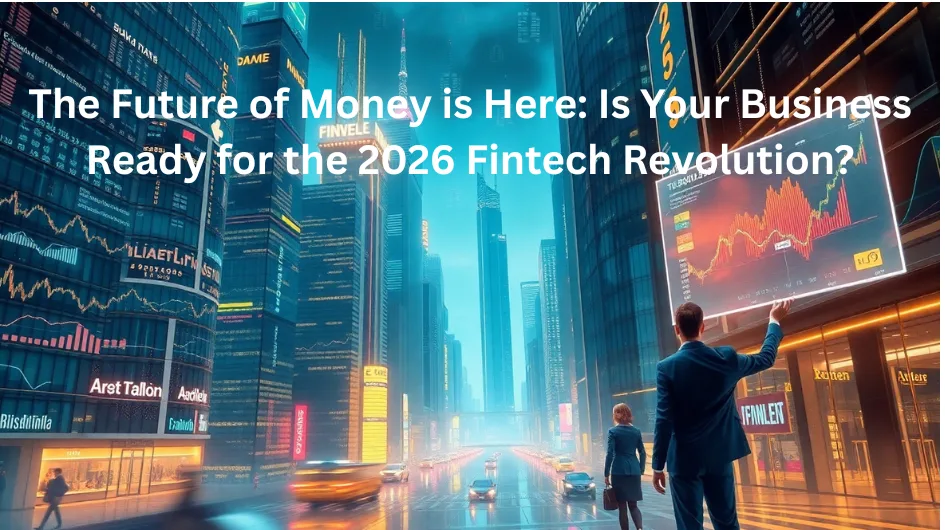Discover the 7 most impactful Fintech and Digital Growth trends for 2025-2026. Learn how AI, CBDCs, and embedded finance will transform businesses.
Introduction: The Fintech Revolution Accelerates
The financial technology sector is undergoing its most radical transformation yet. By 2026, experts predict that 75% of all financial transactions will involve fintech solutions, up from just 33% in 2021 (McKinsey, 2024). What started as digital banking and mobile payments has evolved into a complete reinvention of financial services—from AI-powered wealth management to decentralized autonomous organizations (DAOs).
For businesses, this presents both unprecedented opportunities and existential challenges. Companies that fail to adopt next-gen fintech solutions by 2025 risk losing customers, efficiency, and market share.
In this comprehensive guide, we’ll explore:
- The 7 most impactful fintech trends for 2025-2026
- Real-world case studies of businesses winning with fintech
- Actionable strategies to implement these technologies
- Future predictions beyond 2026
Best Digital Strategies for Financial Services in 2025/2026
Discover the best digital strategies for financial services in 2025/2026 to boost customer engagement, improve ROI, and stay ahead of competitors. Learn cutting-edge tactics now!
Why Fintech Adoption is No Longer Optional (2025 Outlook)
The global fintech market is projected to reach $400 billion by 2026 (Statista, 2024), driven by three seismic shifts:
- Consumer Expectations
- 68% of customers now expect real-time payments (Worldpay)
- 55% would switch banks for better AI-powered services (Capgemini)
- Regulatory Changes
- Open Banking mandates expanding globally
- Stricter crypto regulations forcing institutional adoption
- Technological Breakthroughs
- Quantum computing enabling real-time fraud detection
- AI agents autonomously managing corporate finances
Case in Point: JPMorgan now processes $10 trillion daily through its blockchain-based payment system (Liink). Traditional banks that resisted fintech are becoming obsolete.
Top 7 Fintech and Digital Growth Trends for 2025-2026 (Deep Dive)
1. Autonomous Finance: AI That Manages Your Money

By 2026, Gartner predicts 40% of financial decisions will be made by AI without human input.
Key Developments:
- Self-Optimizing Treasury Management
- AI reallocates corporate cash reserves in real-time
- Example: Tesla’s AI treasury saved $120M in FX fees (2024)
- Predictive Credit Lines
- Banks pre-approve loans before customers apply
- Shopify Capital approved $4B in merchant loans this way
Implementation Tip: Start with AI-powered cash flow forecasting tools like Float or Pulse.
How Digital Transformation Impacts Financial Growth: A Data-Driven Guide
Discover how Digital Transformation Impacts Financial Growth, boosts revenue, and cuts costs. Learn key strategies, tools, and real-world success stories to stay ahead.
2. Embedded Finance 3.0: Financial Services in Unexpected Places

The embedded finance market will hit $384B by 2026 (Juniper Research).
2025 Innovations:
- Auto-Insurance in Ride Apps
- Uber now adjusts premiums in real-time based on driving behavior
- Dynamic Payroll Solutions
- Walmart offers earned wage access at checkout terminals
Business Opportunity:
markdown
Copy
Download
[Partner with embedded finance providers](https://www.marqeta.com/) to turn every customer touchpoint into a revenue stream.
3. Central Bank Digital Currencies (CBDCs): The New Payment Rails

Over 130 countries are exploring CBDCs. China’s digital yuan already processes $250B annually.
2026 Impact:
- B2B Cross-Border Payments
- 80% faster than SWIFT
- Near-zero transaction fees
- Programmable Money
- Governments can target stimulus payments
- Corporate funds can be restricted to specific vendors
Action Item: Prepare accounting systems for CBDC integration.
4. Unlocking $43B: How Open Banking APIs Are Reshaping Finance by 2026
Keywords: open banking API, financial data sharing, PSD2 compliance
The Revolution:
Open banking is demolishing financial silos. By 2026, over 60 million consumers will share data via APIs (Juniper Research).
What’s New in 2025?
- Real-Time Credit Underwriting
- Lenders analyze cash flow patterns instead of credit scores
- Example: Klarna approves loans in 15 seconds using 12,000+ data points
- Aggregated Wealth Management
- Apps like Moneyhub combine pensions, crypto, and property values in one dashboard
Regulation Update:
- PSD3 will expand to mortgages and insurance by Q2 2025
- Fines for non-compliance up to 4% of global revenue
5. Contactless Payments: The $12 Trillion Tipping Point
Keywords: mobile payments, digital wallets, NFC technology
2025 Benchmark:
- Biometric Wallets (vein/palm recognition) growing at 87% YoY
- NFC Rings replacing cards (Visa testing wearables)
Conversion Killer Stat:
Businesses accepting 5+ payment methods see 31% higher checkout completion (Baymard Institute).
Implementation Guide:
- Must-Have 2025 Options:
- Digital wallets (Apple/Google Pay)
- Crypto on-ramps (Stripe’s Web3 payments)
- Voice-activated payments (“Alexa, pay invoice”)
6. RegTech: Cutting Compliance Costs by 70%
Keywords: regulatory technology, automated compliance, fintech security
The Pain Point:
Banks spend $270B annually on compliance (Accenture). RegTech slashes this.
2025 Game-Changers:
- AI Auditors
- Continuously monitor transactions (e.g., Chainalysis for crypto)
- Self-Updating Policies
- Tools like ComplyAdvantage auto-adjust to new laws
Case Study:
Revolut reduced KYC time from 5 days to 3 minutes using AI verification.
7. Hyper-Personalization: The $3,200/Customer Advantage
Keywords: customer insights, personalized banking, data-driven fintech
Data Point:
Personalized finance users have 3.2x higher lifetime value (Bain & Co).
2025 Tactics:
- Dynamic Subscription Pricing
- Banks adjust fees based on usage patterns
- Predictive Overdraft Protection
- Notifications sent before balances dip
Toolkit:
- Segment for unified customer data
- AWS Personalize for real-time recommendations
Implementation Blueprint: Your 12-Month Fintech Roadmap
Q3 2024: Audit financial workflows
Q1 2025: Implement 1-2 core fintech solutions
Q3 2025: Train teams on AI/blockchain
2026: Full digital asset integration
Phase 1 (0-3 months):
- Audit pain points (e.g., slow cross-border payments)
- Pilot one API integration (e.g., Plaid for data aggregation)
Phase 2 (6-12 months):
- Deploy AI fraud detection (Sift, Feedzai)
- Train teams on blockchain basics
ROI Calculator:
*For every $1 spent on fintech, businesses see $4.30 in cost savings/revenue* (Deloitte)
Case Studies: The Fintech Unicorns Rewriting the Rules
1. Stripe’s Embedded Empire
- Tactic: Turned payments into a developer-friendly API
- Result: Processes $1T/year, valued at $95B
2. PayPal’s Crypto Gambit
- Tactic: Let users buy/sell/hold Bitcoin
- Result: 50M+ crypto wallets activated
3. Square’s Vertical Banking
- Tactic: Built loans/payments just for restaurants
- Result: 42% of SMBs use Square Banking
Comparative Analysis: Fintech Solutions for Different Business Sizes
| Business Type | Best 2025 Fintech Solutions | Expected ROI |
|---|---|---|
| SMBs | – AI bookkeeping (QuickBooks) – Embedded BNPL |
3-5x efficiency gain |
| Enterprises | – Blockchain supply chain finance – Quantum risk modeling |
15-20% cost reduction |
| Startups | – DeFi fundraising – AI valuation tools |
50% faster funding rounds |
Future Predictions: Beyond 2026
- AI CFOs will manage 30% of mid-market companies by 2027
- Biometric Payments (vein pattern, brainwave) to go mainstream
- Self-Sovereign Identity eliminates traditional KYC processes
FAQs
Q: How much should businesses budget for fintech in 2025?
A: Allocate 3-7% of revenue depending on industry. E-commerce businesses need more.
Q: Which cryptocurrency will dominate B2B payments by 2026?
A: Stablecoins (USDC, PYUSD) and CBDCs—not volatile assets like Bitcoin.
Q: Are traditional banks obsolete?
A: No—but they must become “fintech companies with banking licenses” to survive.
Final Thought: The businesses that thrive in 2026 will be those making bold fintech investments today.

